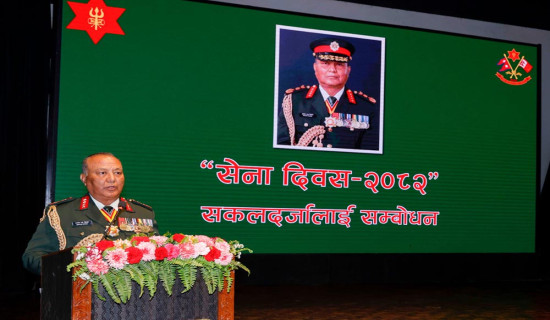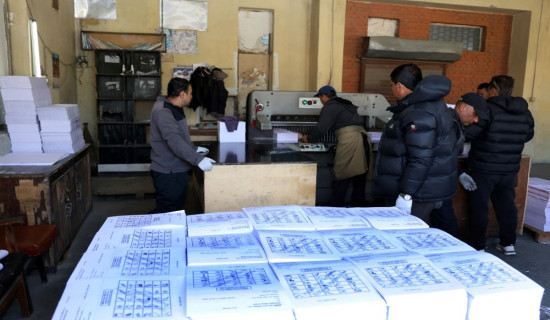- Saturday, 14 February 2026
Formulating Local Youth Policy
Nepal has become one of the youngest countries in the world with 40.3 per cent of the youth population. The state, therefore, should pay attention to maximising the utility of youth potential. The new governance structure warrants the formulation of new legislation in consonance with the spirit of the new constitution promulgated in 2015. However, local governments face relatively stiffer challenges owing to the lack of access to effective and efficient human resources. Even though the legislative body-- Village/Municipal Assembly-- is obliged to carry out such tasks, they mostly assign it to the Chief Administrative Officers who already have their hands full with other administrative duties.
Hence, the formulation of new policies is often discouraged. The first cohort of the local government representatives had somehow learnt about their legislative roles in the last five years. But we now have a new set of representatives, most of whom are, again, ignorant about such processes. Youth Dialogue Groups can play a crucial role in filling this gap. While working with Youth Dialogue Groups in Dhanusha and Rolpa districts of late, this scribe witnessed the extraordinary ways in which we can leverage this national youth dividend to strengthen local governments. The Groups assisted in formulating Local Youth Policy in Nagarain Municipality of Dhanusha and Rolpa Municipality of Rolpa.
Localised policy
The National Youth Policy, 2010 lacks policy to address the particular youth issues in local bodies. The dialogue groups advocated its necessity and sensitised local government representatives, youth leaders, youth-oriented civil society organisations and the media about it. They then drafted the policy on behalf of their respective municipalities and handed it over to their local assemblies for promulgation.
The newly introduced policy also shifted the local governments’ perceptual limitation of equating youth-friendly policy as limited to sports and entertainment. The dialogues helped in identifying necessary provisions in education, employment, health and social security, empowerment and leadership development, participation and mobilisation, entertainment, control of drug abuse, access to science and technology, youth in peace and security and partnership, etc. In fact, these provisions have been mandated by the National Youth Policy 2010, Youth Vision 2025, and many other youth-related national and international commitments. The dialogue groups sensitised duty-bearers and rights-holders alike, bringing new energy and participation to the policymaking process.
At the outset, many local government representatives were reluctant, and thought that the policy would incur an extra burden in terms of resource management and programme execution. This, however, does not hold much water as the local governments too, in a similar fashion to provincial and federal governments, lag in capital expenditure allocations. Hence, if there is something at all that hinders the execution of this policy, it is a lack of prioritisation in the budget planning process. Therefore, the dialogue group members are trained on the seven-step budget planning process provisioned in the Local Government Operation Act, 2074. After the training, they were able to convince the local representatives on how, within the same budget ceiling, actionable programmes could be designed and oriented toward youth mainstreaming.
The dialogue groups essentially followed the steps in the dialogical process: preliminary study/desk review, selection of the facilitator, subtle/separate meeting, issue analysis, joint meeting and review. Through dialogue, they first identified and agreed on the issue. Then they started sensitising the issue with the concerned stakeholders. Several rounds of separate dialogues were held with different stakeholders. The dialogues helped the stakeholders to find common ground and ensured that the policy the local governments were in the process of formulating was relevant, just, feasible, subject to monitoring, and aligned with the national priorities.
At the behest of the local governments, the dialogue groups drafted and presented the draft policies in the meeting of the Executive Committees. The Committees made necessary amendments so that they would not clash with federal and provincial policies. In order to ensure the ownership of the local youths in the policies, the dialogue groups then held multi-stakeholder dialogues, involving the local youths. As it was important to coordinate with different agencies under different ministries while implementing this policy, the Executive Committee formed a five-member ‘Local Youth Policy Coordination Committee’ under the leadership of an Executive Committee member appointed by the Municipal Head.
Partnership
The same Coordination Committee is responsible for building a partnership between the governmental, non-governmental, private sector and volunteer sector working on the issues of youths in their municipalities. The effectiveness of the work of the Committee is monitored by a ‘Local Youth Policy Monitoring & Evaluation Committee’ formed under the leadership of the District Coordination Committee (DCC) Head or any DCC member appointed by the Head. Now the municipalities are making corresponding working procedures necessary for the execution of the policy, which is also being facilitated by the dialogue group members.
This work through dialogue has forged better relationships between youths and other stakeholders. There was also a great level of behavioural change. The local representatives, who used to perceive youth as troublemakers, have now started engaging them in policy making process. On the other hand, the youths now better understand the functioning of the local governments. Based on this successful case/experience, it is highly recommended that the state and non-state actors replicate initiatives like this throughout the country. Local governments have been devolved with unprecedented power, yet they lack appropriate plans and policies to help them achieve the societal transformation envisioned by the constitution. Mobilising young people can help bridge such gaps.
(Senchurey works at the Policy Research Institute.)













-original-thumb.jpg)


